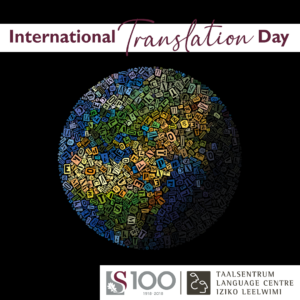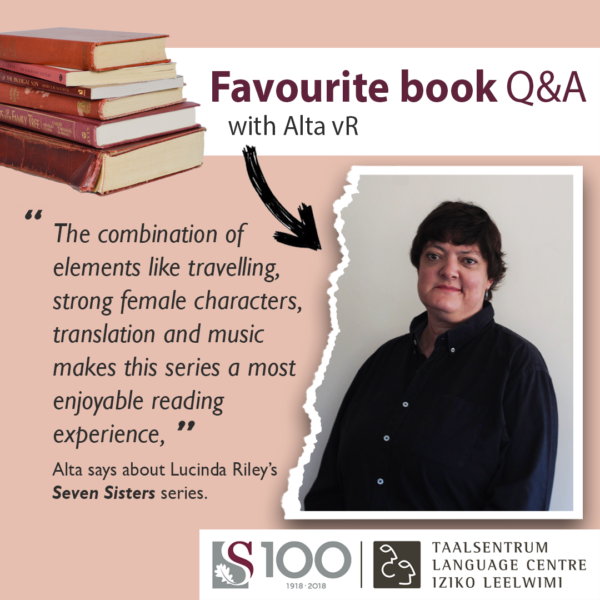Why do translators translate?
In celebration of International Translation Day on 30 September, we’ve approached a few of the translators with whom the Language Centre collaborates to share with us why they do the work they do – why do they translate?
Read on to see everything they say – we think they are absolute superheroes!
“Most useful information, perhaps worldwide, is made available in the English language. The rest of the people who do not understand that language are, in a sense, a ‘forgotten people’. Translators, therefore, translate to make information available to such ‘forgotten people’. Every translated text moves the reader from a world of darkness to a world of light. How fulfilling!”
“Olona lwazi lubaluleke kakhulu, phantse kulo lonke ihlabathi, lufumaneka ngolwimi lwesiNgesi. Bona bantu abangalaziyo olo lwimi phantse bafana ‘nabaphoswe kwelokulibala’. Abaguquli-lwimi ke ngoko baguqula ulwimi ngenjongo yokuba ulwazi lufunyanwe nangabo ‘baphoswe kwelokulibala’. Oko kubhaliweyo kwaza kwaguqulelwa kolunye ulwimi kususa lowo ukufundayo ebumnyameni kumse ekukhanyeni. Ayindonwabisi ngako loo nto!”
“George Bernard Shaw once said: ‘The single biggest problem in communication is the illusion that it has taken place.’ This ‘illusion’ – merely assuming that a message has been accurately conveyed and correctly understood – has been the cause of many a conflict. Therefore, I translate to make communication real and concrete for as many people as possible, particularly against the backdrop of our multilingual country where misunderstandings easily creep in.”
“George Bernard Shaw het eenmaal gesê: ‘Die heel grootste probleem in kommunikasie is die illusie dat dit plaasgevind het.’ Daardie ‘illusie’ – die blote aanname dat ’n boodskap akkuraat oorgedra en reg verstaan is – was al die oorsaak van soveel onenigheid wêreldwyd. Ek vertaal dus om kommunikasie vir soveel moontlik mense werklik en konkreet te maak, veral teen die agtergrond van ons meertalige land waar misverstande bitter maklik ontstaan.”
“People often ask me, ‘Don’t you get bored sitting in front of a computer all day translating?’ That’s laughable. Only this week, I translated mathematics, QR codes, an executive summary, aircraft instrumentation theory, medical practice and art history. How can that possibly be boring? It is my passion and I love every second of it. My only regret is that I cannot remember every single fact – I would have been the most intelligent person on earth!”
“Mense vra dikwels, ‘Raak jy nie verveeld om heeldag voor ʼn rekenaar te sit en vertaal nie?’ Dis belaglik. Die afgelope week het ek wiskunde, QR-kodes, ʼn bedryfsopsomming, vliegtuiginstrumentasieteorie, mediese praktyk en kunsgeskiedenis vertaal. Hoe kan dit vervelig wees? Dit is my passie en ek geniet elke sekonde daarvan. Al waaroor ek spyt is, is dat ek nie elke liewe feit kan onthou nie – ek sou die intelligentste mens op aarde gewees het!”
“I think I translate because I am convinced that the world would have been a very different place if there had never been communication problems between people – and language is human beings’ primary means of communication. I like good, clear communication that starts at Point A and progresses logically to the end, regardless of whether the end is at Point B or Point Z. It gives me great satisfaction to translate a well-written message from one language to another and to do so clearly and economically, avoiding wordiness and high-faluting, ambiguous terminology. I like translating a text in such a way that the target readers enjoy reading or hearing it. It’s an amazing feeling to know that I got a translation just right.”
“Ek dink ek vertaal omdat ek oortuig is dat die wêreld heeltemal ‘n ander soort plek sou gewees het as daar nooit wankommunikasie tussen mense was nie, en taal is mense se primêre kommunikasiemiddel. Ek hou van goeie, duidelike kommunikasie wat by punt A begin en in logiese stappe by die einde kom, of die einde nou by punt B of punt Z is. Dit gee my ‘n besondere gevoel van genoegdoening om die boodskap in ‘n goeie teks in een taal klinkklaar, ondubbelsinnig en sonder frilletjies en valletjies oor te dra in ‘n ander taal. Ek hou daarvan om ‘n teks só te vertaal dat die teikenlesers dit geniet om dit te lees of aan te hoor. Dis sommer net vir my vreeslik lekker om te weet ek stuur ‘n goeie vertaling die wêreld in. “
“I love words. Words direct our humanity. They have so much power – something that we are not always consciously aware of.”
“Ek hou van woorde. Woorde rig ons menswees. Hulle beskik oor soveel mag – iets waarvan ons nie altyd bewustelik kennis neem nie.”

